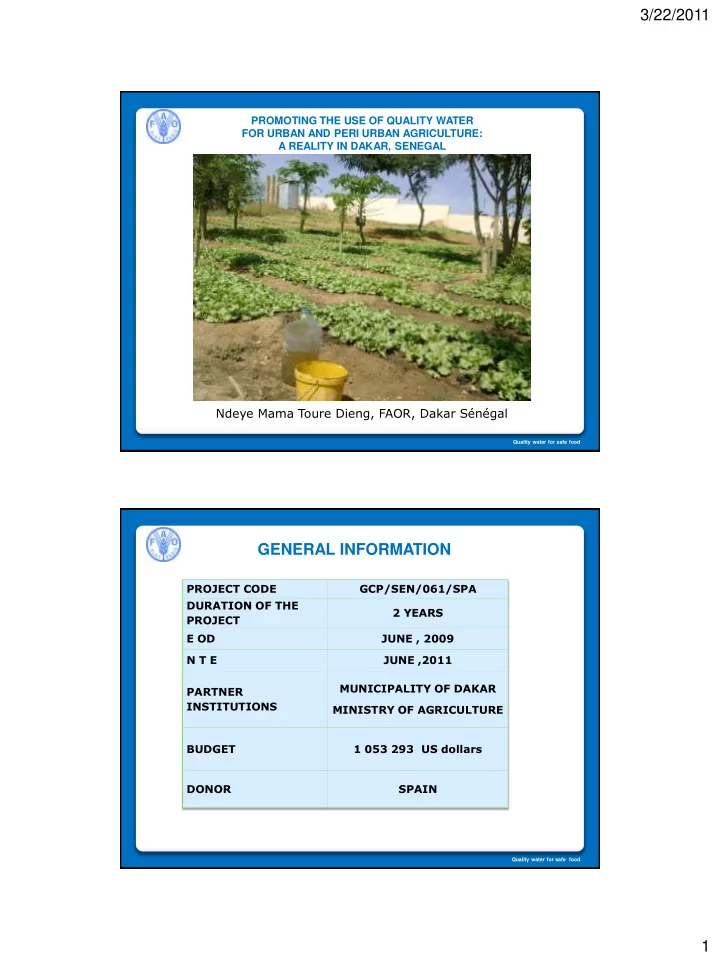

3/22/2011 PROMOTING THE USE OF QUALITY WATER FOR URBAN AND PERI URBAN AGRICULTURE: A REALITY IN DAKAR, SENEGAL Ndeye Mama Toure Dieng, FAOR, Dakar Sénégal Quality water for safe food GENERAL INFORMATION PROJECT CODE GCP/SEN/061/SPA DURATION OF THE 2 YEARS PROJECT E OD JUNE , 2009 N T E JUNE ,2011 MUNICIPALITY OF DAKAR PARTNER INSTITUTIONS MINISTRY OF AGRICULTURE BUDGET 1 053 293 US dollars DONOR SPAIN Quality water for safe food 1
3/22/2011 AREA OF INTERVENTION OF THE PROJECT PROJECT Quality water for safe food AREA OF INTERVENTION OF THE PROJECT Patte dOie and Pikine Niayes area Quality water for safe food 2
3/22/2011 JUSTIFICATION OF THE PROJECT An alarming and paradoxical situation: The use of untreated water to produce vegetable that are mostly consumed raw (lettuce, cucumber, tomato and green pepper) While The national office of sanitation ( ONAS ) is implementing a wide program of wastewater treatment in Dakar: • two treatment plants • treated water used by a golf course and roads constructors Water is available but farmers do not have access to it. Quality water for safe food JUSTIFICATION OF THE PROJECT In Pikine and Guediawaye many farmers have stopped their activities due to lack of water, all the flourishing related activities have also stopped Quality water for safe food 3
3/22/2011 JUSTIFICATION OF THE PROJECT Producers in the Patte d’Oie and Camberene zone use water from digged ponds and are facing salinity and pollution problems Small pond in the Patte d’Oie Quality water for safe food 4
3/22/2011 JUSTIFICATION OF THE PROJECT Quality water for safe food Lettuce washed with water from the pond after harvest MAIN OBJECTIVE OF THE PROJECT Enhance the availabilty and access to quality water for sustainable urban and periurban agriculture in order to contribute to food and nutritional security and income generation for the population Quality water for safe food 5
3/22/2011 CONTEXT A new municipal governance Institutional instability at ONAS with many changes of directors 73% of targeted beneficiaries are on precarious land tenure: rent, sharecroppers, entrusted No way to deliver property rights Nevertheless, the area remains for agriculture in all development plans and the Mayor has stated that no more building authorization will be delivered Quality water for safe food EXPECTED RESULTS Improved tenure security for farmers in project area. Two irrigation networks with treated wastewater serving 250 peri- urban farmers A manual on the use of extensive treatment systems and good practices for the uses of wastewater 1500 farmers and instututions are trained in: good agricultural practices good uses of treated wastewater maintenance of irrigation infrastructures and equipments water quality monitoring Quality water for safe food 6
3/22/2011 ACHIEVEMENTS SO FAR Letter of Agreement with the Municipality of Dakar Organization, information and awareness campaigns for producers Capacity building in management for beneficiaries Advocacy for land security of horticulture production areas Implementation of a credit line within the Municipal Development Fund for UPA producers Communication and relation with media Quality water for safe food Letter Of Agreement ONAS – UPROVAN- PROJECT ONAS : Provides 2000m3/day tertiary treated wastewater and 900m3/day secondary treated wasterwater at 0.1 USD /m3 and 0.04 USD/m3 respectively Supports the design of irrigation infrastructures and equipments, supervises the works of installment of pumping, stores, transports and distributes treated waste water UPROVAN : Uses the treated water for the purpose of horticulture production only Implements the good practices for wasterwater use Pays water bills to ONAS Insures that the infrastructures and equipments are well maintained Project : Facilitates project implementation and negotiations among partners Provides the funds to acquire the goods and services needed for the works Monitors the implementation of the works Quality water for safe food 7
3/22/2011 Letter of Agreement with ENDA RUP Have an overview of the knowledge on extensive treatment technologies using macrophytes and microphytes Realize a pictorial manual on the use of extensive treatment systems and good practices for the use of wastewater Hold a workshop on extensive treatment technologies and water quality management Quality water for safe food Irrigation network schemes Quality water for safe food 8
3/22/2011 Construction works Shelter for power driven pump water storage Basin under construction Quality water for safe food Irrigation Equipments Quality water for safe food 9
3/22/2011 Capacity building for producers Credit line of 100 000 USD FODEM Training on Hortivar data base and use of Good practices for the use of IPPM cards wastewater Seminar on water management and reuse of waste water during the symposium on UPH Manual of procedures for the Material for monitoring water management and maintenance of quality infrastructures Organizational management Management and maintenance of infrastructures Quality water for safe food CONCLUSIONS AND PERSPECTIVES • The option of reuse of treated waste water in horticulture is technically feasible • Its implementation has to be supported by an important information and awareness campaign • There is a need to increase the ratio of wastewater recycling (80% of domestic water is dumped as used water) • Strengthening the partnership between sanitation offices, farmers and support organisms is the key to success Quality water for safe food 10
3/22/2011 THANK YOU FOR YOUR ATTENTION Quality water for safe food 11
Recommend
More recommend